About a week ago, the BBC were forced to confirm that John Simm would be returning to Doctor Who to play The Master alongside Michelle Gomez’s Missy. While the manner of this spoiler damage control was colossally annoying, it’s led to a lot of fun speculation about just how well the two incarnations will work together. A lot of people are expecting a Master vs. Missy showdown, but, given the clear throughline of the character over the course of the show’s history, I think they’re going to get on like someone else’s house on fire.
Roger Delgado was the first actor in the role, appearing for the first time in “Terror of the Autons.” The character was set up, almost straight away, as a dark mirror of the Doctor. What made him especially interesting was how that gave context to the often mercurial, difficult-to-like Third Doctor. Where he was impulsive and at times dismissive, Delgado’s Master was calm, patient, and even likeable, in a way that made the Third Doctor’s emotional growth all the more powerful and, in turn, the Master’s lack of it all the more telling.
Delgado, tragically, was killed in a car accident in 1973 and the role was relegated to limbo while the show tried to work out where to go with it. Peter Pratt and Geoffrey Beevers both played the Master after Delgado but each time appeared under heavy makeup and gore—this Master was at the end of his final regeneration and desperate for more life. That led to his turn in “The Keeper of Traken,” in which the character transferred his life force into an innocent scientist named Tremas. That in turn led to him forcing the Doctor’s regeneration into his fifth incarnation, with the added emotional baggage of Tremas being the father of the Fifth Doctor’s companion, Nyssa. With a new Doctor, played by Peter Davison, and a new Master, played by Anthony Ainley, the show moved definitively into a new era.
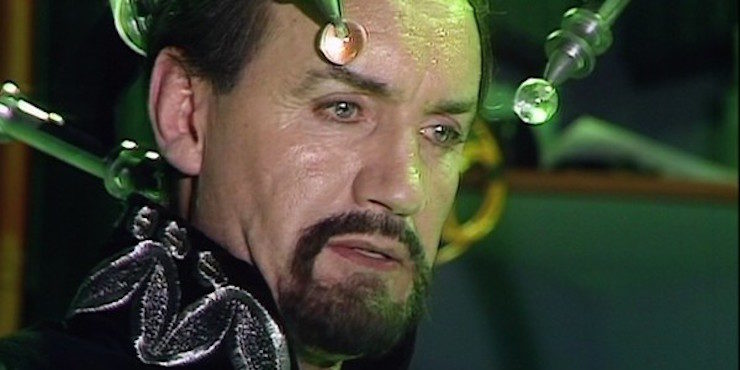
Ainley’s stint as the Master was where I first started watching Doctor Who, and he remains one of my favorite aspects of the show. He took the urbane, upper class approach Delgado brought to the role and added a mischievous, charming spin. Ainley’s Master is at the start of his lives and he LOVES his work, and that enthusiasm comes across every time he’s on screen. He’s joyous and feral in equal measure and clearly obsessed with the Doctor. Witness his excellent turn in “The Five Doctors”, where the Master finds himself allied with the Doctor’s first incarnation. There’s an almost Loki-like quality to the character, as he enjoys messing with his (currently) elderly rival but at the same time seems desperate for his respect and attention. Ainley’s run is full of moments like this, and it remains a highlight of the show’s run of more than five decades.
That being said, Ainley’s Master, just like the first incarnation of the show, had a bad end. “Survival” was a great story that was murdered in the edit and is only dragged back over the line by the sheer effort expended by Sylvester McCoy, Sophie Aldred, Lisa Bowerman, and, of course, Ainley. Despite the story’s problems, his final scenes have real power to them, precisely because you know they are final scenes. The Ainley version of the Master goes out hard…while the show itself followed him a few minutes later, and would only return to fully televised glory sixteen years later.
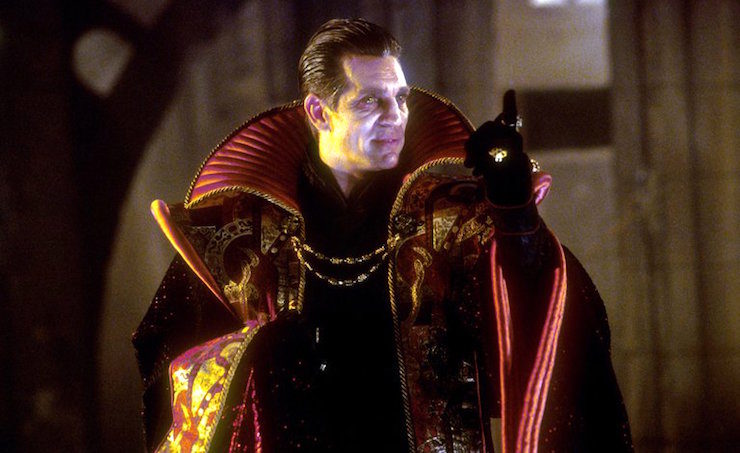
But let’s talk about Eric Roberts for a second. The 1995 TV movie gets a lot of flak, much of it richly deserved—however, the casting is spot on throughout and Roberts, in particular, is a joy. After the initial “zombie Terminator” scenes, which do fall a little flat, he rapidly transforms into one of the most entertaining incarnations of the character to date. Witty, urbane, just a little camp, and clearly tremendously enjoying the game, this Master is immensely relieved to still be alive and intent on having as much fun as possible. His verbal sparring match with the Doctor in the back of the ambulance is a joy, his relentless determination to survive is pure Master, and Roberts even wears the massive Gallifreyan robes well. Taken too soon, sir. Taken too soon.
That being said, if you absolutely have to leave the stage early, leave it early because Sir Derek Jacobi is up next. Jacobi technically only plays the Master for a handful of scenes. As Professor Yana, introduced in “Utopia” he comes across as far more as a Doctor analogue—there’s the same slightly flamboyant clothing, the same erratic charm. He even has a companion.
But it’s when Yana sees the pocket watch and finally starts to remember who he truly is that modern Doctor Who pulls off one of its greatest coups. In the space of a few seconds we see Jacobi prove exactly why he’s one of the best actors in the world. His posture, expression, everything changes as the memories come flooding back. Better still, with it comes one of the show’s most horrific, tragic, and understated realizations…
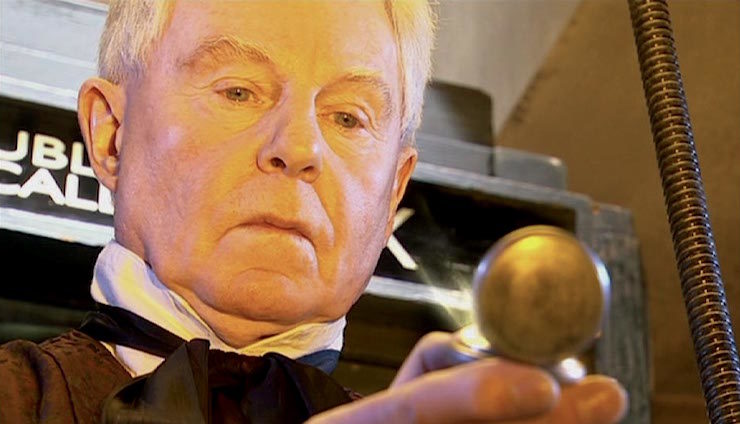
The Master, terrified by the events of the Time War, used a Chameleon Arch to hide himself away. And he hid inside the idea of the Doctor: a scientist, someone there to help, fixated on humanity, and unable to quite look his past in the eye. The Master’s disguise was the man he wanted to be but wasn’t brave enough to become. A man who, in turn, became far closer to the Master than he ever wanted to during his time as the War Doctor.
Jacobi’s work, and the writing underlying it, is extraordinary. It’s also the foundation for John Simm’s completely different but just as iconic portrayal. Show runner Russell T. Davies has often discussed how they’ve intentionally written Time Lords as imprinting on the people around them when they regenerate, taking on some of their qualities. This is why the second Tenth Doctor (let’s call him 10.5) sounds like Donna. It’s also a nice backhanded explanation for why Twelve is Scottish. His last thoughts as Eleven are of Amy Pond, so he carries her accent through into his next life.
In the Master’s case though, it leads to this delicious moment of self-awareness as one of the best actors of his generation basically does a frighteningly excellent impersonation of one of the other best actors of his generation. Simm’s Master is Tennant’s Doctor with the brakes off and too much caffeine: fast-talking, flamboyant, energetic, and delighting in the sound of his own voice. But where Ten has all these qualities tempered by his crippling survivors’ guilt and barely-contained rage, Simm’s Master has no such restrictions. Becoming Prime Minister, in what still stands as the show’s best-handled plot arc, is just the start.
https://www.youtube.com/watch?v=ptRxrH1rVK8
Look at the moment that opens “Last of the Time Lords.” The Master’s exuberant song and dance number, set to “I Can’t Decide” by Scissor Sisters is a note-perfect sketch of everything you need to know about him. He’s joyously cruel, obsessed with order, can’t quite bring himself to kill the Doctor, and wants very badly for everybody to see how clever he is. That’s why Martha’s family are still alive and also why the most disturbing moment, I’d argue, in the entire modern run of the show to date, is hidden in plain sight.
Lucy Saxon’s black eye. Glimpsed in passing but categorically there, and unavoidable.
This version of the Master is abusive, the Doctor’s love for humanity curdled into something the Master can’t escape and can’t deal with. His offhand cruelty grounds his epic schemes in the most literal sense: this fraction of a man, this fraction of a Time Lord only knows violence and plausible charm. Everything he builds contains the means of his own destruction as a result and it’s no accident that Lucy is ultimately responsible for both his demise here and his maiming in “The End of Time.” By then, Simm’s Master is closer to the Beevers and Pratt version: a leaking container of feral energy whose plan is carried out as much to see if he can do it as for any practical or tactical reason.
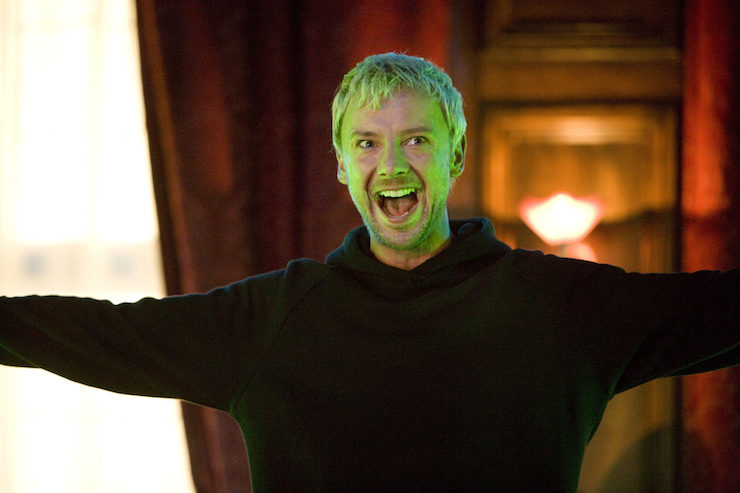
And yet, this Master also has arguably the best ending of any incarnation. The power dynamic between Tennant and Simm in that final episode is incredible, and they really emphasize the idea that these two men are only ever one bad or good day from being each other. The repeated “Get behind me” moment is particularly fantastic, as the Master closes the circuit on his own morality. He’s a monster. His people are monsters, and they’ve made him so. Finally, his violence and rage is pointed in the right direction and he does the one good thing he can do: save the world, even as he runs towards his first, and last, good fight.
Her fight, it turns out, was just beginning…
Missy, played by Michelle Gomez, may be the single best idea the new version of the show has ever come up with. Costumed like an evil Mary Poppins, Missy takes the feline curiosity and savagery of Simm’s incarnation to glorious new levels. She also tempers it with a level of patience no incarnation since the original has had and the result is just a joy. Missy is influencing the story long before we see her, bringing Clara and the Doctor together and manipulating events to keep them where she wants them. When she finally makes her presence felt it’s a moment of pure theater: the Doctor caught completely off-balance and wrong-footed not just by her presence but her plan.
More impressive still, the idea of Missy wanting to help the Doctor become someone new is sweet, even kind, albeit in a deeply disturbing way. Just as she’s become a woman for (we presume) the first time, the Doctor is now on a new set of lives. Everything’s up for grabs and the moment where she loses her patience and yells “I WANT MY FRIEND BACK!” is all the explanation we need. This is Missy trying to “save” the Doctor. It also hints as some very interesting—and very dark—implications about just what sort of young Time Lord the Doctor once was.
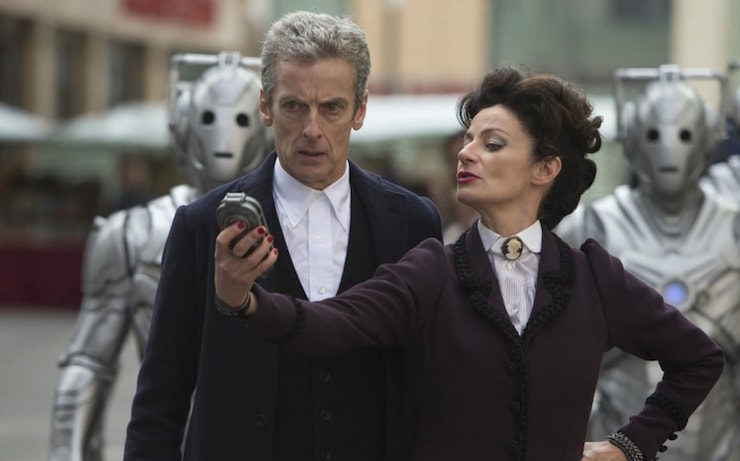
Plus, Missy is FUN in a way no previous version has been. Her double act with Clara in “The Witch’s Familiar” is some of the funniest material the show has ever produced and it’s all sold by Gomez’s fizzy, gleeful delivery. “Not seeing you as sandwiches now” and “Every miner needs a canary” are especially great lines, but every moment they’re on screen together is comedy gold. Better still, it’s all completely earned and in service to the script. Clara is an eminently fragile human on a planet full of angry robotic death machines. Missy is a force to be reckoned with, possessing an unknown number of extra lives and a galaxy-sized reservoir of self-belief—one who can quip, whilst murdering a Dalek, “I’m a Time Lady; it’s our golf.”
The Master is the definitive Doctor Who villain (now villainess). Like all the best nemeses, she’s a reflection of him, defined by the exact opposite of his choices and motivations. And like all truly extraordinary nemeses, she’s also absolutely at peace with that dynamic. That’s why I hope the Simm and Missy incarnations get along: because…well, they have a lot to talk about. Either way, the thought of seeing not one but two incarnations of one of the best villains in TV history on screen at the same time has us eagerly counting the hours until the show returns on Saturday.
Alasdair Stuart is a freelancer writer, RPG writer and podcaster. He owns Escape Artists, who publish the short fiction podcasts Escape Pod, Pseudopod, Podcastle, Cast of Wonders, and the magazine Mothership Zeta. He blogs enthusiastically about pop culture, cooking and exercise at Alasdairstuart.com, and tweets @AlasdairStuart











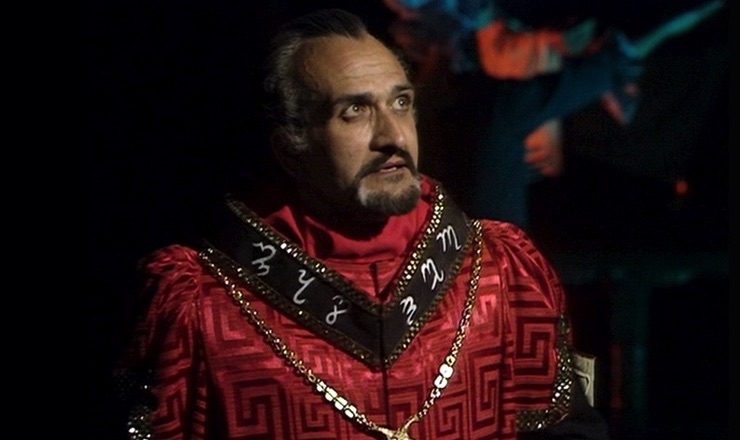
It’s worth noting, too, that Delgado, Pratt, Beevers, Ainley, and Roberts are ALL technically playing the same incarnation of the Master. No one really mentions that. Pratt and Beevers played the rotted out husk of Delgado’s final life, refusing to die. Ainley’s is the captured body of Tremas (as you note), and not biologically a Time Lord at all, really. He’s sort of the Quirrel to the Master’s Voldemort. The same with Bruce in the 1996 film. It’s still the Thirteenth Master possessing a human.
You missed the Alex MacQueen Fourteenth Master, however, from the Big Finish dramas (which Night of the Doctor made canon). He’s sort of the Colin Baker of the bunch (they even sound similar), and plays like a weird mixture of the Beevers pure-monster and Simm’s manic charm. The Time Lords pulled him out of the Eye of Harmony (following the 96 film) to help deal with events that would lead into the Time War, in the Dark Eyes and Doom Coalition audio arcs. I understand not wanting to count him, being not in the show, but I thought it worth a mention. Lovely article, had not heard the bit about the regenerations copying the people around the Doctor at the time. What a neat thought.
There are two scenes that perfectly explain the relationship between the Doctor and the Master:
https://youtu.be/X6Tk6wzTjvs
https://youtu.be/jE6lIB87VAc
Each wants the other to validate their life choice. They both want to be together, but on different terms. And then there is the only good bit in Death in Haven, when the Doctor has become the President of Earth against his will: “Remember all those years when all you wanted to do was to rule the world?” It would be extremely easy for the Doctor to rule any part of the universe (he’s been Lord President of Gallifrey for instance), but that’s worse than worthless to him. And the Master can’t accept that.
When I heard Roberts’ Master correct Grace’s grammar, I thought “Yup, he’s a villain all right.” Seriously, no one should correct anybody’s grammar except when copyediting. It’s rude and it gives English majors a bad rep.
The first eppy for me was the last twenty minutes of “Logopolis,” so Ainley was the first version of the Master I saw.
Great analysis of Jacobi’s Master.
I’ve always found Missy annoying–right up there with Gordon Brittas of The Brittas Empire and both policemen in Doc Martin.
The original Master was such a dark reflection of the Doctor, that originally the Third Doctor’s final story was going to be him realizing the Master was the evil part of him made flesh (like the later Valyard character) and reabsorbing him. This only didn’t happen because Delgado’s tragic death meant they had to rewrite that last story.
@@.-@ – Where did you get the bit about the (Delgado) Master being revealed as the evil part of the Doctor from? I’ve heard/read about that rumour several times but I’ve never actually seen a source for it. It’s mentioned in the TARDIS Data Core wiki, also unsourced.
Everything I’ve read about the tentative story – The Final Game – suggests that the Master would ultimately kill himself to save the Doctor. I’m curious about where the bit about him being the evil part of the Doctor comes from.
Basically, Delgado’s Master was Professor Moriarty crossed with Peter Cushing’s Dr. Frankenstein, and Ainley’s Master was Delgado’s Master crossed with Snidely Whiplash. They were both fun, but Ainley was more of a broad, cackling caricature of evil.
Roberts… Well, I’ve never been a great fan of his work, and a Master with an American accent is just wrong. Jacobi was fantastic and I wish he’d stuck around. I hate the Simm Master; he had his good moments of drama here and there, but the Jim Carrey-esque mugging and antics are unbearable and I just do not like the actor. I find Gomez almost as annoying; I have nothing against the idea, but I don’t like the execution. I want my debonair, cool, imperious Master back. After all, he (or she) is the Master. That implies a commanding and authoritarian personality, not a clownish figure. The Doctor can be clownish, but I don’t think it works for the Master.
@1/Christopher Ruocchio: I’ll give you Pratt through Roberts as the same incarnation, but what’s the basis for assuming that Delgado was the 13th Master? I don’t see any reason to rule out other incarnations of the Master between his last encounter with the Third Doctor and “The Deadly Assassin.” After all, they’re time travelers, so they don’t have to experience their lives in sync (no matter how often the show tends to assume they do). The Master could’ve gone through a number of intervening incarnations. I always assumed that was why we stopped seeing the Delgado Master — maybe he regenerated and his new self decided to avoid the Doctor for a while.
I also got the impression somewhere — maybe from the novelization of “Assassin”? — that the Master had “burned off” his lives as a result of his need to periodically change identities, I guess when his usual disguise skills weren’t enough. That doesn’t make a lot of sense, but it’s an impression I’ve had for decades. I always wished we’d gotten to see some of those other incarnations of the Master, either before or after Delgado’s. I’m partial to the fan theory that the War Chief from “The War Games” is one of them, although I think the tie-in books established them as separate people.
Characters like this are always fun and funny, but they are hardly achievements. Writing the fast-talking, charismatic psychopath villain is such a British trope. They’re practically a British god. I’m guilty of this too, so I get how easy it is to write someone always one step ahead, always saying the right thing, because you end up letting the villain know everything beforehand. There’s no explanations for why they know what they know, they just do.
I guess what I’m saying is these sorts of characters are always audience pleasers, but often the salivating over them entirely overblown.
I’ve heard it said that one’s first Doctor will always be ‘The Doctor’ to them. Because I first encountered Doctor Who on a local PBS station that played them as they could get them, my first Doctor was number 4, and Tom Baker remained ‘My Doctor’ even as the station got other seasons and other Doctors. It was not until that station got it’s hands on Third Doctor episodes that I first remember seeing The Master.
Since then, there is the new series, and Christopher Eccleston is now ‘My Doctor’. However, not withstanding a number of really fine performances, for me Roger Delgado will always be ‘The Master’.
@@@@@6 Christopher, I couldn’t agree more about Simm and Missy. Just irritating. Keeping Derek Jacobi would have made for a much more intense antagonist – but I suppose they wanted a younger Master to go with the younger Doctor – but way too much gurning for my liking.
@@@@@ 8 – Totally agree – Delgado will always be “my” Master, too.
I am with C Bennett re Simms and Gomez. Precious somehow. Not my thing.
@6: “When his usual disguise skills weren’t enough”?
From TV Tropes: “The original Master from Doctor Who used “Reverend Magister” in “The Daemons” and “Professor Thascalos” in “The Time Monster”. His later incarnations preferred Significant Anagrams or Paper Thin Disguises like Colonel Masters. In the Spin-Off novels the Master uses more translations, including “Inspector LeMaitre” (Last of the Gaderene) and “Duke Dominus” (the short story The Duke of Dominoes). In The Quantum Archangel, the Master poses as a Serbian businessman called “Gospodar”, prompting the Sixth Doctor to wonder if he’s “running out of languages”.
Non-canonical, but Jonathan Pryce played the Master, to Rowan Atkinson’s (other, briefly, several others’) Doctor.
@11/Athreeren: I was referring to disguises, i.e. transformations of appearance, not aliases. Although I guess Delgado’s Master mainly just used aliases, while Ainley’s was the one who liked to don makeup and wigs and so forth — perhaps because he was wearing a stolen face and body to begin with.
Okay, I found the reference I was thinking of in the novelization Doctor Who and the Deadly Assassin by Terrance Dicks, on p. 99 of the 1977 Target Books edition (1984 reprinting):
The episode used a different phrasing for Spandrell’s exposition about the cause of death, and skipped the rest. I would guess that the added material was in Robert Holmes’s script and cut for time.
It’s a pretty hardcore notion, if you think about it — the Master essentially committing suicide repeatedly just to conceal his identity, or to get out of situations too dire to escape any other way. Imagine if they’d actually done it that way on the show post-Delgado. Any villain the Doctor faced could’ve turned out to be a new incarnation of the Master. And then he could’ve appeared to die at the end of the story, only to come back later with yet another face.
This brings me back to my full-blown Anglophile days, when I was (naturally) a raving Doctor Who fan. I still love the Master. I find his, uh, unkillability perversely inspiring.
Having not watched much Classic Who, and nothing with the Master, at that, I thank you for this article. Derek Jacobi is indeed amazing in that scene where his memories come back, and you never expect him to be the Master (I knew of the character, even if I had never seen stories with him).
Good analysis of Simm’s Master. Missy is great, too; Gomez is brilliant.
As for the Master and Missy joining up, I am looking forward to that. I hope they make out.
Roger Delgado was the first actor whose Time Lord character’s NAME was “the Master”, but he was NOT the first actor to play the character at all. Edward Brayshaw played the exact same character in The War Games, only he wasn’t called “the Master” yet.
It’s 1990’s revisionism that “Delgado was the first”. Peter Darvill-Evans who oversaw the New Adventures books liked the idea that “Roger Delgado was the first”, and so rewrote history to say so. And today it’s received wisdom that that was the case. But Malcolm Hulke, Robert Holmes and Terrance Dicks all said in the 70’s that “the War Chief” and the Master are one and the same.
@16/Andrew: You’re overstating it. The War Chief and the Master were created as distinct characters, but people began to suspect that they could be the same, and Dicks and Hulke hinted at this in their subsequent books but never made it explicit.
https://tardis.fandom.com/wiki/The_War_Chief#Connection_with_the_Master
@17/Christopher
Sorry, but Tardis Data Core is a modern fan website, run by modern fans. It’s not definitive.
You would require actual confirmation from the creators themselves.
As such, as just two examples, nobody could read the Delgado Master’s introduction/backstory in either “Doctor Who and the Doomsday Weapon”(written by Hulke) or “Doctor Who and the Terror of the Autons”(written by Dicks), and say with a straight face that that’s NOT the ‘War Chief’.
It’s not “hinted” or “implied”. It’s stating it outright.
@18/Andrew: “You would require actual confirmation from the creators themselves.”
That’s my whole point. You’re the one presuming something without confirmation, and I’m saying it’s reckless to jump to that conclusion. Yes, the books you reference do prove that Malcolm Hulke and Terrance Dicks were willing to equate the War Chief with the Master in 1974-5. That is not in question. The point is that it does not prove anything about Robert Holmes’s intentions when he created the Master in 1971. So if you claim that the Master was always intended to be the War Chief, that is unproven unless you can show me confirmation from Robert Holmes in 1971.
@19/Christopher
Why Robert Holmes? That is going on an assumption. As Hulke and Dicks wrote The War Games, and created the Master for that story, then what they say is final. And, as shown, they both stated outright that it’s the same character.
Even Robert Holmes would(and did) state that he was a hired writer in 1971, and that Barry Letts and Terrance Dicks commissioned him to write Terror of the Autons using the Master and the Autons.
In other words, Holmes didn’t create the Master. Dicks(and Hulke) did, and Holmes was paid to write a story(Terror of the Autons) with the Master in it.